大学英语III第五单元
大学英语全新版第三册第五单元答案

2) Tom listened hard, but couldn't _m___a_k__e___o_u__t___ what
his parents were saying because they were talking too softly. (make)
5) Because the Earth is a sphere, sailors __a_t__se_a___
only can view other ships to a distance of about 13 miles before those ships seem to disappear into the horizon.
Unit 5: How to celebrate holidays
NCE-B3
1) At the end of a hard day, Sue likes to go home and
__s__t_r_e__t_c__h__o__u__t____ in her favourite armchair listening
3) How often things occur by mere chance which we
dared not even _h__o__p__e__f_o__r_____. (hope)
4) If he hears something he can't understand, my
brother always t_u__r_n_s_ it _o__v_e_r_ in his mind until he
more previous back index break over
大学英语三(综合教程)第五单元

大学体验英语三(综合教程)Unit 5Lifelong EducationListen and TalkLead inThe purpose of education is not only to train youngsters for the 1) , but to prepare them for tomorrow's society. Because of the rapidly changing world, one can argue that changes will be continuous, which will make lifelong learning necessary for those who expect to 2) successfully. While some may argue that their education commenced when they began school and 3) when they completed it, modern reality suggests that education is a lifelong process, and the classroom is merely the beginning of the education process. The 4) of its definition implies that education is lifelong.Lifelong education 5) and affects all existing educational providers, and extends beyond the formal educational providers to include all bodies and individuals 6) learning activities.Lifelong education means enabling people to learn at different times, in different ways, for different purposes 7) of their lives and careers.Key: 1. employment market 2. handle the changes 3. concluded4. very nature5. builds on6. involved in7. at various stagesPassage A: Tongue-tied2. Answer the following questions with the information from the passage.1) What was the author's immediate response when the driver passed her a slip of paper?She wondered if it was a joke or a threat.2) What did the author mean by saying "clever is not clever if it doesn't communicate"?She realized that her explanation didn't help because it could not be understood.3) How much does the author know of the differences between "proverb", "peculiar" and "idiomatic"?She might use them subconsciously, but she couldn't give a simple and clear explanation.4) Why did the author hope that the driver owned a dictionary?Because she felt depressed at her deformed misleading English explanation.5) What can we learn from this passage?Open3. Choose the best answer to each question with the information from the passage.1. What does the author imply about the hard-bitten city dwellers?A) They are not confident about themselves.B) They are not so willing to help others.C) They are friendly to strangers.D) They are not very knowledgeable.2. What can we infer from the passage?A) The author is unwilling to help the driver.B) English is not the author's native language.C) The driver was slow to understand the author.D) It is easier to use a word than to explain it.3. What did the author realize when she found that the driver couldn't understand her?A) She wasn't as curious as the driver.B) She didn't really know a lot of her own language.C) She should feel regretted having agreed to help.D) She was trapped by the driver for more fare.4. Why did the author mention "Haste makes waste"?A) To use it as an example to explain a proverb.B) To remind the driver to drive slowly.C) To advise that learning should take time.D) To tell a story beginning with a saying.5. Which of the following statements is true according to the passage?A) The author herself is not a native speaker of English.B) The author herself is not a native speaker of English.C) The driver impressed the author with his eagerness to learn English.D) The author thought her explanations were very clever.Anwser: 1.B, 2.D, 3.B, 4.A, 5.C4. Fill in each of the blanks with an appropriate word.This is an amusing short story which illustrates how little people sometimes know about their mother tongue. The narrator is a woman, a p___in a taxi whose driver is a Pakistani man e ___to learn English by asking his passengers about new words. Struggling to e___the meanings of a proverb and an idiom, she realizes how little she really knows about the v___of her native language and also w___what kind of answers other, probably equally i___, native passengers might give. In the end she is left hoping that the driver has a d___and that he will use it to teach himself rather than depend on the native speakers for e ___.Anwser: 1.passenger 2.eager 3.explain 4.vocabulary 5.wonders6.ignorant7.dictionary8.explanations5. Choose the one word or phrase that best keeps the meaning of the underlined part in each sentence.1. The coward in me was much too pleased with this solution.A) courageB) fearC) satisfactionD) personality2. He returned to his hometown so that he could indulge his passion for football.A) developB) enjoyC) breakD) limit3. A desperate man will resort to anything.A) care for nothingB) destroy anything within his reachC) try to kill himselfD) turn to anything for help4. He jotted down her number on a slip of yellow paper.A) read carefullyB) wrote down quicklyC) glance quickly atD) drew with care5. She looked at him in such distress that he had to look away.A) amusementB) angerC) painD) pleasureAnwser: 1.B, 2.B, 3.D, 4.B, 5.C6. Fill in the blanks with the words given below. Change the form where necessary.assume commit confuse hint misleadpeculiar puzzle quality retreat vague1. Being the son of a professor does not ___ him for the scholarship consideration.2. The police suspect that it was John who ___ the murder.3. So far, the new manager has given little ___ that he won't be any different from the former one.4. From all the indications, it is safe to ___ that the prices of cars will go down by large margins.5. Some of his instructions are outdated and others are too ___ to be understood. .6. The local dialect sounds a little ___ to the people from the north.7. The failure of the movie hastened her decision to ___ from the glamorous screen and spend more time with her family.8. The woman's headache ___ the doctor; he couldn't find the cause.9. The state has laws that protect consumers against fraud or ___ sales practices.10. He tried to explain the complicated theory to me, but I got even more ___ by the technical terms in his explanation.Anwser: 1. qualify 2. (had) committed 3. hint 4. assume 5. vague6. peculiar7. retreat8. puzzled9. misleading 10. confused7. Complete the following sentences with phrases or expressions from the passage. Make changes where necessary.1. The local government's decision to reduce unemployment benefits enraged the workers who were laid off and they ____ violent protest.2. What's the point of ____ for months over something that a good teacher could have explained in minutes?3. The boy admires his father and ____ his every word.4. The manager pulled the pencil and pad from his shirt pocket and ____ every word the customer said.5. At present, the whole world seems to be ____ about how to cope with economic globalization. Anwser: 1. resorted to 2. racking your/one's brains 3. hangs on 4. jotted down 5. at a loss8. Translate the following sentences into English.1. 知道原理是一回事,但要付诸实践又是另外一回事。
大学英语第三册UNIT5全文翻译对照(精选五篇)

大学英语第三册UNIT5全文翻译对照(精选五篇)第一篇:大学英语第三册UNIT5全文翻译对照Writing Three Thank-You Letters Alex HaleyIt was 1943, during World War II, and I was a young U. S. coastguardsman. My ship, the USS Murzim, had been under way for several days. Most of her holds contained thousands of cartons of canned or dried foods. The other holds were loaded with five-hundred-pound bombs packed delicately in padded racks. Our destination was a big base on the island of Tulagi in the South Pacific. 写三封感谢信亚利克斯·黑利那是在二战期间的1943年,我是个年轻的美国海岸警卫队队员。
我们的船,美国军舰军市一号已出海多日。
多数船舱装着成千上万箱罐装或风干的食品。
其余的船舱装着不少五百磅重的炸弹,都小心翼翼地放在垫过的架子上。
我们的目的地是南太平洋图拉吉岛上一个规模很大的基地。
I was one of the Murzim's several cooks and, quite the same as for folk ashore, this Thanksgiving morning had seen us busily preparing a traditional dinner featuring roast turkey.我是军市一号上的一个厨师,跟岸上的人一样,那个感恩节的上午,我们忙着在准备一道以烤火鸡为主的传统菜肴。
大学英语综合教程第三册unit 5
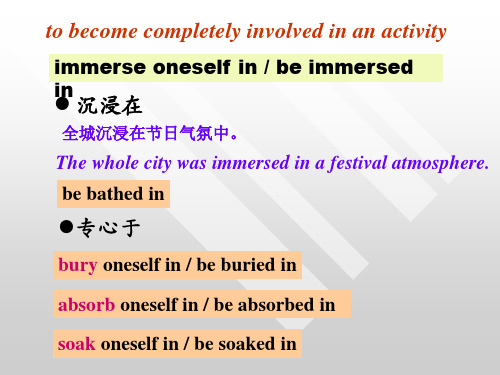
Part II (10-23)
The writer wrote three thank-you letters
his father the Reverend Nelson to __________ , __________________ his grandmother. and ________________. Later on, He got
4. I don’t know how to thank you for such an attractive present. It is something that will give me pleasure for a long time to come. 5. I am, now writing to express my great appreciation for the timely help you offered.
Thank those who cheated you, because they increased your wisdom.
感激欺骗你的人,因为他增进你的智慧
Thank those who forsook you, because they taught you to be independent.
Expresses her loving gratefulness _______________ to her grandson.
Grandmother
Part III (24-26)
The writer wishes everyone to find the good and praise it ____________________________.
Letters Received
大学英语3第五单元

Unit 5 Text APage 146Pair Work1.No, he doesn’t. Because his personal experience tells him this is wrong.2.He was a merchant and had been in business in Japan for many years. He was a tiny littlefellow, not much more than five feet four in height, and very slender, with white hair, a redface much wrinkled, and blue eyes.3.Edward Burton had done something the narrator could never have believed he would, unlesshe had heard the story from his own lips. Both in appearance and manner he suggested thetype of character you would not associate with such an action.4.Lenny Burton was a remittance man living in Japan. Edward Burton used to play bridge withhim.5.In his eyes, Lenny was not a bad chap, and he liked him.\6.He got, from time to time, a bit of money from his family in London and made a bit more bycard-playing.7.He called at his namesake’s office to ask for a job.8.Edward refused his request and humiliated him.9.The response showed that he was a cruel man because he even made fun of Lenny who wasdown and out instead of giving him help.10.Edward asked Lenny to swim from the Shioya Club round the beacon and land at the creek ofTarumi. It was over three miles and rather difficult.11.Because he knew that he was not in good condition and might not make it.12.Yes. Because Edward said that he hadn’t got a vacancy in his office when he set the condition.Page 147Working on Your Own1.Paragraphs Main IdeasPartsPart One Paras 1 It is no easy to judge people, for they aren’t always what theyappear to bePart Two Paras 2-3 Kind and gentle, Edward Burton, a wealthy merchant, appearedas if he could not bear to hurt a fly.Part Three Paras 4-51 As it turned out, Burton was cold-blooded enough to send afriend to certain death.2.Paragraphs Main IdeassectionsSection One Paras 4-16 What Edward knew about LennySection Two Paras 17-31 How Edward responded to Lenny’s requestSection Three Paras 32-51 How Edward, a “kind” gentleman, handled a friend in desperateneed of helpPage 147Language Sense Enhancement1.(1) struck (2) mild (3) gentle (4) raise it (5) benign(6) with point (7) something of (8) made every penny (9) small and frail(10) not bear to hurt a flyPage 150V ocabularyI1.1) In a way 2) in accordance with 3) vacancy 4) in good condition5) transparent 6) rub 7) spicy 8) hitherto9) with (a) bad grace 10) instinct 11) pawned 12) currentPage 1512.1) turned up 2) will stick to 3) brought back 4)go about5) driving at 6) put …away 7) turning…over 8) took abackPage 1523.1) She has a very weak constitution --- she may not be able to survive the operation.2) I was taken a back by the insurance company’s rejection of my compensation claim.3) It was something of a surprise when we ran into each other in a place like that.4) My hair needs trimming/ to be trimmed ---it’s getting too long.5) Appearances are often deceptive.Page 1524.1) Oddly enough / went broke / wrinkled / he had gone all to pieces2) definite / is capable of / her vanity3) too mild / sipping / strokePage 153II. Usage1. Except for2. except that3. except4. except when5. except to6. except what7. except where8. except thatPage 154III. British and American EnglishPage 155Comprehensive ExercisesI.Cloze1.1). insane 2).current 3). candid 4). capable5). was taken aback 6). in good condition 7). constitution 8). go all to pieces9). gone broke 10). vacancy 11). mild 12). deceptivePage 1562.1). suspected 2). pleading 3). confirmed 4)stunned 5)lucrative 6). jewellery 7 ). wealthy 8 ). urge 9 ). spell 10). ArrestedPage 156II.Tanslation1.1) I have an instinct that Henry will seek to join the expedition, because he is something of an adventurer.2) He is capable of sticking to the task at hand, even if he is exposed to noises.3) The trademark was registered in accordance with the laws hitherto in force.4) Oddly enough, many people volunteered to help organize the meeting, but only a few turnedup.5) The teacher’s affectionate words, along with his candid comments, changed the way Mikeperceived the society and himself.2.For my own part, I find that appearances are all too often deceptive. For instance, you might be wrong if you judged by appearances only people like Edward Hyde Burton. In appearance, he seemed a man all of a piece. He was a tinylittle fellow with white hair and mild blue eyes, gentle and candid. Nevertheless, he turned out to be very cruel. He insulted and fooled Lenny who was down and out and made him commit himself to an insane venture. What was still more surprising was that he was completely indifferent to Lenny’s death. Without doubt, Burton was a man with a heart of stone.。
大学英语读写3第五单元作文

Title: The Evolution of Technology and Its Impact on Modern CommunicationIn today's fast-paced world, the evolution of technology has revolutionized the way we communicate. From the early days of the telegraph and Morse code to the modern era of smartphones and instant messaging, technology has continually transformed the landscape of communication. The telegraph, invented in the 19th century, marked a significant milestone in the history of communication. It allowed messages to be transmitted over long distances almost instantaneously, replacing the slow and inefficient methods of the past. The advent of the telephone in thelate 19th century further accelerated the process, enabling voice communication between people separated by vast distances.With the dawn of the 20th century, the development of radio and television broadcasting brought about a new era of mass communication. These inventions allowed information and entertainment to reach a wide audience simultaneously, breaking down barriers of geography and time.The 21st century has witnessed an unprecedented explosion in the field of technology, particularly in the realm of digital communication. The internet, smartphones, social media, and instant messaging platforms have reshaped the way we interact with each other. People can now stay connected with friends and family across the globe, share information and ideas instantaneously, and access a vast array of resources and services with the click of a button. However, the rapid advancement of technology has also presented its own set of challenges. The overuse of digital devices and social media has led to issues such as addiction, cyberbullying, and the spread of misinformation. Additionally, the constant bombardment of information and notifications can lead to feelings of anxiety and stress. Despite these challenges, the evolution of technology has undoubtedly made our lives easier and more convenient. It has opened up new avenues for communication, learning, and entertainment, and has connected people from diverse backgrounds and cultures. As we continue to embrace new technologies, it is important to remain mindful of theirpotential impact on our lives and to use them in a responsible and balanced manner.**科技演变及其对现代通信的影响**在如今快节奏的世界中,科技的演变彻底改变了我们的交流方式。
大学英语三(综合教程)第五单元

大学体验英语三(综合教程)Unit 5Lifelong EducationListen and TalkLead inThe purpose of education is not only to train youngsters for the 1) , but to prepare them for tomorrow's society. Because of the rapidly changing world, one can argue that changes will be continuous, which will make lifelong learning necessary for those who expect to 2) successfully. While some may argue that their education commenced when they began school and 3) when they completed it, modern reality suggests that education is a lifelong process, and the classroom is merely the beginning of the education process. The 4) of its definition implies that education is lifelong.Lifelong education 5) and affects all existing educational providers, and extends beyond the formal educational providers to include all bodies and individuals 6) learning activities.Lifelong education means enabling people to learn at different times, in different ways, for different purposes 7) of their lives and careers.Key: 1. employment market 2. handle the changes 3. concluded4. very nature5. builds on6. involved in7. at various stagesPassage A: Tongue-tied2. Answer the following questions with the information from the passage.1) What was the author's immediate response when the driver passed her a slip of paper?She wondered if it was a joke or a threat.2) What did the author mean by saying "clever is not clever if it doesn't communicate"?She realized that her explanation didn't help because it could not be understood.3) How much does the author know of the differences between "proverb", "peculiar" and "idiomatic"?She might use them subconsciously, but she couldn't give a simple and clear explanation.4) Why did the author hope that the driver owned a dictionary?Because she felt depressed at her deformed misleading English explanation.5) What can we learn from this passage?Open3. Choose the best answer to each question with the information from the passage.1. What does the author imply about the hard-bitten city dwellers?A) They are not confident about themselves.B) They are not so willing to help others.C) They are friendly to strangers.D) They are not very knowledgeable.2. What can we infer from the passage?A) The author is unwilling to help the driver.B) English is not the author's native language.C) The driver was slow to understand the author.D) It is easier to use a word than to explain it.3. What did the author realize when she found that the driver couldn't understand her?A) She wasn't as curious as the driver.B) She didn't really know a lot of her own language.C) She should feel regretted having agreed to help.D) She was trapped by the driver for more fare.4. Why did the author mention "Haste makes waste"?A) To use it as an example to explain a proverb.B) To remind the driver to drive slowly.C) To advise that learning should take time.D) To tell a story beginning with a saying.5. Which of the following statements is true according to the passage?A) The author herself is not a native speaker of English.B) The author herself is not a native speaker of English.C) The driver impressed the author with his eagerness to learn English.D) The author thought her explanations were very clever.Anwser: 1.B, 2.D, 3.B, 4.A, 5.C4. Fill in each of the blanks with an appropriate word.This is an amusing short story which illustrates how little people sometimes know about their mother tongue. The narrator is a woman, a p___in a taxi whose driver is a Pakistani man e ___to learn English by asking his passengers about new words. Struggling to e___the meanings of a proverb and an idiom, she realizes how little she really knows about the v___of her native language and also w___what kind of answers other, probably equally i___, native passengers might give. In the end she is left hoping that the driver has a d___and that he will use it to teach himself rather than depend on the native speakers for e ___.Anwser: 1.passenger 2.eager 3.explain 4.vocabulary 5.wonders6.ignorant7.dictionary8.explanations5. Choose the one word or phrase that best keeps the meaning of the underlined part in each sentence.1. The coward in me was much too pleased with this solution.A) courageB) fearC) satisfactionD) personality2. He returned to his hometown so that he could indulge his passion for football.A) developB) enjoyC) breakD) limit3. A desperate man will resort to anything.A) care for nothingB) destroy anything within his reachC) try to kill himselfD) turn to anything for help4. He jotted down her number on a slip of yellow paper.A) read carefullyB) wrote down quicklyC) glance quickly atD) drew with care5. She looked at him in such distress that he had to look away.A) amusementB) angerC) painD) pleasureAnwser: 1.B, 2.B, 3.D, 4.B, 5.C6. Fill in the blanks with the words given below. Change the form where necessary.assume commit confuse hint misleadpeculiar puzzle quality retreat vague1. Being the son of a professor does not ___ him for the scholarship consideration.2. The police suspect that it was John who ___ the murder.3. So far, the new manager has given little ___ that he won't be any different from the former one.4. From all the indications, it is safe to ___ that the prices of cars will go down by large margins.5. Some of his instructions are outdated and others are too ___ to be understood. .6. The local dialect sounds a little ___ to the people from the north.7. The failure of the movie hastened her decision to ___ from the glamorous screen and spend more time with her family.8. The woman's headache ___ the doctor; he couldn't find the cause.9. The state has laws that protect consumers against fraud or ___ sales practices.10. He tried to explain the complicated theory to me, but I got even more ___ by the technical terms in his explanation.Anwser: 1. qualify 2. (had) committed 3. hint 4. assume 5. vague6. peculiar7. retreat8. puzzled9. misleading 10. confused7. Complete the following sentences with phrases or expressions from the passage. Make changes where necessary.1. The local government's decision to reduce unemployment benefits enraged the workers who were laid off and they ____ violent protest.2. What's the point of ____ for months over something that a good teacher could have explained in minutes?3. The boy admires his father and ____ his every word.4. The manager pulled the pencil and pad from his shirt pocket and ____ every word the customer said.5. At present, the whole world seems to be ____ about how to cope with economic globalization. Anwser: 1. resorted to 2. racking your/one's brains 3. hangs on 4. jotted down 5. at a loss8. Translate the following sentences into English.1. 知道原理是一回事,但要付诸实践又是另外一回事。
大学英语教材3unit5答案

大学英语教材3unit5答案Unit 5: Answer Key for University English Textbook 3I. VocabularyA. Definitions:1. Exponential growth /ɪkˌspəʊˈnɛnʃəl ɡrəʊθ/: a rapid increase in size or amount, especially when it keeps multiplying at a constant rate.2. Incessantly /ɪnˈsɛsəntli/: without interruption or cessation; constantly or continuously.3. Elicit /ɪˈlɪsɪt/: to draw out or bring forth reaction or information from someone.4. Impending /ɪmˈpɛndɪŋ/: about to happen or occur very soon.5. Redundant /rɪˈdʌndənt/: not or no longer needed or useful; exceeding what is necessary or normal.6. Advocate /ˈadvəkət/: to publicly support or recommend a particular cause, policy, or action.B. Contextual Usage:1. The population of the city has experienced exponential growth in recent years.2. Despite her tiredness, she worked incessantly to complete the project on time.3. The teacher's thought-provoking question elicited a lively discussion among the students.4. We need to make the necessary preparations for the impending storm.5. With the advances in technology, some jobs have become redundant.6. The environmentalists advocate for stricter laws to protect endangered species.II. Reading ComprehensionA. Reading Passage:In recent years, artificial intelligence (AI) has taken center stage in various fields, revolutionizing the way we live and work. The exponential growth of AI technology has not only impacted industries like healthcare and finance but also transformed education.AI has the potential to revolutionize the classroom experience by automating administrative tasks, personalizing learning, and enabling better student-teacher interactions. For instance, AI can streamline administrative tasks such as grading papers and scheduling, allowing teachers to focus more on actual teaching and engaging with students. Furthermore, AI-powered learning platforms can adapt to individual student needs, providing personalized content, assessments, and feedback. This tailored approach enhances student engagement and promotes self-paced learning.Additionally, AI can facilitate real-time language translation, enabling international students to participate fully in classroom discussions. It overcomes language barriers and fosters inclusivity. Moreover, AI-poweredchatbots can assist students in acquiring language skills by providing practice opportunities in a non-judgmental environment.However, the impending rise of AI in education also raises concerns. Critics argue that excessive reliance on AI might render teachers redundant, thus compromising the quality of education. Furthermore, ethical considerations come into play, such as data privacy and algorithmic biases. It is crucial to find a balance between incorporating AI and maintaining human involvement to ensure a well-rounded educational experience.In conclusion, the integration of AI in education offers numerous benefits, including increased efficiency, personalized learning experiences, and improved language education. While AI can enhance education, it is essential to approach its implementation thoughtfully and consider potential challenges to ensure that it complements and augments the role of educators rather than replaces them.B. Questions:1. How has AI transformed education?2. What tasks can AI automate in the classroom?3. How does AI personalize learning?4. How can AI help international students overcome language barriers?5. What are the concerns associated with the rise of AI in education?6. Why is it important to strike a balance between AI and human involvement in education?III. GrammarA. Sentence Transformation:1. The students were so interested in the lecture that they paid full attention throughout. (so... that)2. Despite the challenges, they managed to complete the project on time. (Despite)3. It is believed that the new policy will have a positive impact on the economy. (It is believed)4. She apologized for her rude behavior at the meeting. (for)5. Could you please lend me your pen? (lend)B. Verb Forms:1. Mary has been studying English for five years. (present perfect continuous)2. They will be leaving for their vacation tomorrow. (future continuous)3. I wish I could play the guitar. (could + base form of the verb)4. She had finished her homework before going to bed. (past perfect)5. If I were you, I would book the tickets in advance. (past subjunctive)IV. WritingWrite a paragraph (100-150 words) expressing your opinion about the impact of artificial intelligence in education. Discuss both the benefits and possible challenges that come with its integration. Use appropriate examples to support your viewpoint.Artificial intelligence has the potential to revolutionize education by providing numerous benefits. By automating administrative tasks, AI allows teachers to dedicate more time to teaching and engaging with students, resulting in a better classroom experience. Additionally, AI's ability to personalize learning permits students to learn at their own pace, increasing engagement and understanding. Language translation services powered by AI are especially beneficial for international students, as it helps overcome language barriers and promotes inclusivity. However, the rise of AI in education also brings concerns. The overreliance on AI may lead to a loss of human interaction, essential for holistic development. Ethical considerations surrounding data privacy and algorithmic biases must be addressed to ensure the responsible integration of AI. Thus, while AI holds immense potential, it is essential to strike a balance between technological advancements and human involvement to harness its benefits effectively.。
全新版大学英语综合教程3Unit5课文翻译

1, 那是在二战期间的1943年,我是个年轻的美国海岸警卫队队员。
我们的船,美国军舰军市一号已出海多日。
多数船舱装着成千上万箱罐装或风干的食品。
其余的船舱装着不少五百磅重的炸弹,都小心翼翼地放在垫过的架子上。
我们的目的地是南太平洋图拉吉岛上一个规模很大的基地。
2,我是军市一号上的一个厨师,跟岸上的人一样,那个感恩节的上午,我们忙着在准备一道以烤火鸡为主的传统菜肴。
3, 当厨师的都知道,要烹制一顿大餐,摆上桌,再刷洗、收拾干净,是件辛苦的事。
不过,等到太阳快下山时,我们总算全都收拾停当了。
4,我想先去后甲板透透气。
我信步走去,一边深深呼吸着空气,一边慢慢地踱着步,头上仍戴着那顶白色的厨师帽。
5,我开始思索起感恩节这个节日来,想着清教徒前辈移民、印第安人、野火鸡、南瓜、玉米棒等等。
6,可我脑子里似乎还在搜索着别的事什么――某种我能够赋予这一节日以个人意义的方式。
大概过了半个小时左右我才意识到,问题的关键也许在于把Than ksgiv ing 这个字前后颠倒一下――那样一来至少文字好懂了:Givi ng th anks。
7,表达谢意――就如在祈祷时感谢上帝那样,我暗想。
对啊,是这样,当然是这样8,可我脑子里一直盘桓着这事。
9,过了片刻,如同晨曦初现,一个更清晰的念头终于涌现脑际――要感谢他人,那些赐我以诸多恩惠,我根本无以回报的人们。
令我深感不安的实际情形是,我向来对他们所做的一切受之泰然,认为是理所应当。
我一次也没想过要对他们中的任何一位真心诚意地说一句简单的谢谢。
10,至少有七个人对我有过不同寻常、影响深远的帮助。
令人难过的是,我意识到,他们中有一半已经过世了――因此他们永远也无法接受我的谢意了。
大学英语第三册 第五单元教学ppt课件

:
前往 14
Reference words: physician, spare, grief, pass away
By staying with the patient in her last mkoemy ent, the physician finds out that the patient’s heart and mind are as truly graceful as her hands. The patient has sent her family away to spare them the grief and pain of seeing her pass away. In these special last moments between these two human beings the doctor learns what being graceful really is.
:
6
Dominique Bouhours, who was one of those strict hard-nosed French grammarians, died in 1702. Last words were: "I am about to — or I am going to — die: either expression is correct."
• vi.---1. become bad; rot
• 卷心菜曾经开场腐烂了。
• The cabbage had already started to decay.
• 2. lose power, influence, etc. 衰退,衰落,衰败
• 人的智力在年老时会衰退。
新视野大学英语3unit5教案
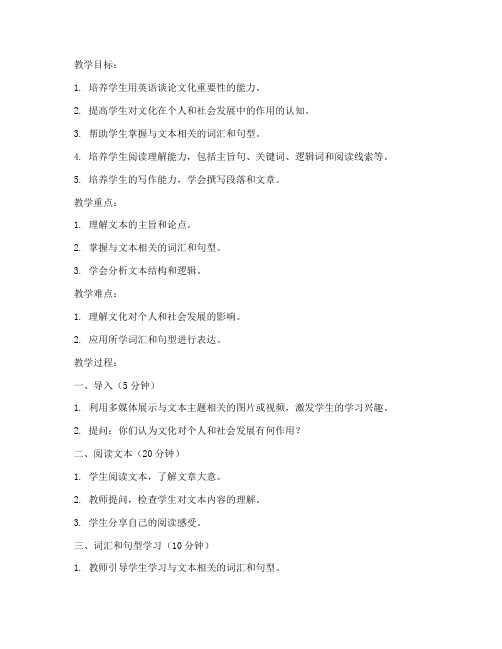
教学目标:1. 培养学生用英语谈论文化重要性的能力。
2. 提高学生对文化在个人和社会发展中的作用的认知。
3. 帮助学生掌握与文本相关的词汇和句型。
4. 培养学生阅读理解能力,包括主旨句、关键词、逻辑词和阅读线索等。
5. 培养学生的写作能力,学会撰写段落和文章。
教学重点:1. 理解文本的主旨和论点。
2. 掌握与文本相关的词汇和句型。
3. 学会分析文本结构和逻辑。
教学难点:1. 理解文化对个人和社会发展的影响。
2. 应用所学词汇和句型进行表达。
教学过程:一、导入(5分钟)1. 利用多媒体展示与文本主题相关的图片或视频,激发学生的学习兴趣。
2. 提问:你们认为文化对个人和社会发展有何作用?二、阅读文本(20分钟)1. 学生阅读文本,了解文章大意。
2. 教师提问,检查学生对文本内容的理解。
3. 学生分享自己的阅读感受。
三、词汇和句型学习(10分钟)1. 教师引导学生学习与文本相关的词汇和句型。
2. 学生通过小组讨论,运用所学词汇和句型进行练习。
四、文本分析(15分钟)1. 学生分析文本结构,找出文章的主旨句、关键词、逻辑词等。
2. 教师引导学生讨论文本的逻辑关系,理解文化对个人和社会发展的影响。
五、写作练习(15分钟)1. 学生根据文本内容,撰写一段关于文化重要性的段落。
2. 教师给予学生写作指导,帮助学生提高写作能力。
六、总结与反思(5分钟)1. 教师总结本节课的主要内容,强调文化的重要性。
2. 学生分享自己的学习心得,反思自己的学习过程。
教学评价:1. 学生对文本内容的理解程度。
2. 学生运用所学词汇和句型的能力。
3. 学生撰写段落的水平。
4. 学生对文化重要性的认识程度。
课后作业:1. 阅读相关书籍或文章,了解文化对个人和社会发展的影响。
2. 收集与文本相关的图片或视频,准备下一节课的展示。
教学资源:1. 新视野大学英语第三版教材。
2. 多媒体设备,如电脑、投影仪等。
3. 相关书籍和文章。
全新版大学英语3 Unit 5 课文

and my reading of their letters left me not only astonished but more humbled than before. 我读了信,既觉得震惊,又深感卑微。 leave 常用于结构:leave sb. + adj./past participle, adj./past participle(此处为 not only astonished but more humbled than before)为宾语补足语。
感激斥责你的人,因为他助长了你的定力! 感激遗弃你的人,因为他教会了你独立! 感激欺骗你的人,因为他增强了你的见识! 感激伤害你的人,因为他磨练了你的心智!
Grandmother
Thank him for teaching the writer how to tell the Expresses her loving gratefulness truth, to share, to be for her grandson forgiving…
Text B
Part One 1-9
Part Tow 10-16
Part Three 17-23
Part Four 24-26
Correspondents
Letters sent
(paras13-15) Thank him for teaching the writer from boyhood to love books and reading. Thank him for his morning school prayers
新标准大学英语三unit5

just the parents and other children, but, for example, grandparents, uncles, aunts, servants, or other housemates. This is known in cultural anthropology as the extended family.
possibly, other children; in some societies there is
an increasing share of one-parent families. Other
relatives live elsewhere and are rarely seen. This type is the nuclear family (from the Latin “nucleus”
identity, and the only secure protection
one has against the hardships of life.
Therefore one owes lifelong loyalty to
one's in-group, and breaking this loyalty
Text
I,
we,
they
2021/11/14
1
Text
I, we, they
1 A medium-sized Swedish high-technology corporation
was approached by a compatriot, a businessman with good
全新版大学英语综合教程3unit5教案
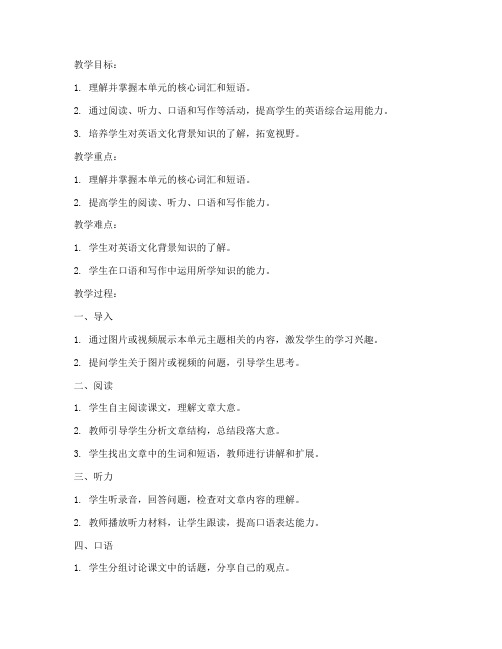
教学目标:1. 理解并掌握本单元的核心词汇和短语。
2. 通过阅读、听力、口语和写作等活动,提高学生的英语综合运用能力。
3. 培养学生对英语文化背景知识的了解,拓宽视野。
教学重点:1. 理解并掌握本单元的核心词汇和短语。
2. 提高学生的阅读、听力、口语和写作能力。
教学难点:1. 学生对英语文化背景知识的了解。
2. 学生在口语和写作中运用所学知识的能力。
教学过程:一、导入1. 通过图片或视频展示本单元主题相关的内容,激发学生的学习兴趣。
2. 提问学生关于图片或视频的问题,引导学生思考。
二、阅读1. 学生自主阅读课文,理解文章大意。
2. 教师引导学生分析文章结构,总结段落大意。
3. 学生找出文章中的生词和短语,教师进行讲解和扩展。
三、听力1. 学生听录音,回答问题,检查对文章内容的理解。
2. 教师播放听力材料,让学生跟读,提高口语表达能力。
四、口语1. 学生分组讨论课文中的话题,分享自己的观点。
2. 教师组织学生进行角色扮演,模拟课文中的场景。
五、写作1. 学生根据课文内容,完成一篇短文写作。
2. 教师对学生的写作进行点评,指出优点和不足。
六、总结1. 教师对本单元所学内容进行总结,强调重点和难点。
2. 学生回顾本单元所学知识,提出疑问。
教学资源:1. 教材《全新版大学英语综合教程3》2. 多媒体课件3. 课外阅读材料4. 听力材料教学评价:1. 学生对课堂活动的参与度。
2. 学生对课堂内容的掌握程度。
3. 学生在写作和口语表达中的表现。
教学反思:1. 教师应根据学生的实际情况,调整教学策略,提高教学效果。
2. 注重培养学生的英语综合运用能力,提高学生的英语水平。
大学英语第三册第五单元

Unit 5, Book ThreeI. Section A: Graceful Hands1. Teaching Objectives:λTo know the meaning and usage of some important words, phrases and patternsλTo be familiar with the writing skills of the text and make use of it in writingλTo Improve Ss reading skills by studying section BTo respond and cooperate with classmates willinglyλTo participate activelyTo read sentences and texts with proper intonationλTo write smoothly and legibly2.Time Allotment:Section A (3 periods):1st---2nd period: Pre-reading activities ( theme-related questions for warming up;)While-reading activities (cultural notes; useful words and expressions;difficult sentences)3rd period: While-reading activities (text structure; main ideas)Post-reading activities (comprehension questions; exercises)Section B(1period):4th periods: Practice of the reading skill (understanding idiomatic expressions);T checks on Ss’ home reading by asking questions based on the passage.T explains some difficult sentences3.Teaching Procedures:3.1 Pre-reading ActivitiesStep 1 GreetingsGreet the whole class as usual.Step 2. Review1. Ask students some questions to review the last lesson(show them on the screen).2. Check the homework(made a survey about a doctor’s life by surfin g the Internet or asking for help from other people);Topics1. discussion about “ a medical eye ”2. Preparation for studying Graceful HandsPurposes1. To develop Ss’ online learning ability2. To improve Ss’ ability to retrieve the relevant informatio n3. To stimulate Ss’ psychomotor thinking4. To arouse Ss’ interest in learning the unitMethod: Talk in groups; Use task-based language teaching method, communicative approach, and audio-lingual method.Step 3. Lead-in and preparation for readingShow the Ss some pictures and let them talk to each other about the topic on the screen. .1. Why does the writer wonder whether Mrs. Clark has anyone loves her?2. Why did Mrs. Clark want the writer to be with her when she died?3. Why did Mrs. Clark send her family home that night?4. What does the newspaper report on Mrs. Clark infer about the importance of her life?5. Give your comment on Mrs. Clark after reading the passage.Purpose: Arouse the students’ interest of study.Method: Use the CAI, PPT software and talk in groups; Use task-based language teaching method, communicative approach, audio-visual method and audio-lingual method.Step 4. Fast readingAsk the Ss read the passage as quickly as they can and answer the questions on the screen. Let them get the main idea of each paragraph and make clear about the text structure.Text structure: (structured writing )Purpose: Improve the students’ reading and writing ability and understand the general idea of each paragraph.Method: Read the text individually and talk in groups; introduce chronological order---listing events according to time sequence;For this passage, the writer is describing what happens according to time sequence, she takes care to focus on single dominant impression that is to be left to readers.The passage can be divided into 6 parts:Part one (para1- para.4 ) telling us something about the writer and the patientPart two (para. 5) creating a dominant impression on readers that the patient is seriously ill, too weak for anythingPart three (para 6- para 7) the real exchange between the two human beings.Part four ( para 8 ) seeming to have a better understanding of the patientPart five (para 9 ) coming to learn more about her from the newspaper two days after herdeathPart six (para 10 ) leaving readers much space for further thoughtsStep 5. Preparation for details of the text on the screenSs are required to look at the words and Phrases on the screen and give a brief presentation in class.Words and Phrases:Purpose:Train the Ss’ ability of understanding and using language.Method: Talk in groups, Use task-based language teaching method, communicative approach and total physical response method.1) preceding: adj. coming or going earlier in time, order, etc.This kind of dress was very fashionable in the preceding years.这种裙子在前几年很流行。
大学英语3 第五章
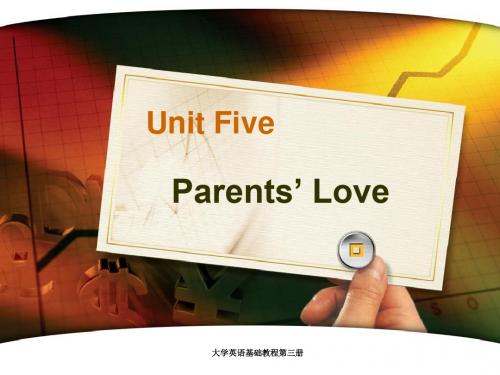
Unit 5 Parents’ Love
Previous Next
Home
Communicative Activity
Oral practice: Invite the classmates sitting near you to practice offering help for each other. You may use the following tips to help you.
Previous 本页播放 全文播放
Next
Home
Lead-in Listening
Second, there will be times when you are met with disappointment instead of____su_c_c_e_s_s___. Life won't always turn out the way you want. Instead of letting these things get you down, push on. Accept disappointment and learn to persevere, to ___p_u_r_s_u_e_y_o_u_r _dr_e_a_m_s___ despite pitfalls. Learn to turn negatives into positives, and you'll do much better in life. Last but no the least, you will also face _h_e_a_r_tb_r_e_ak__a_nd__a_b_an_d_o_n_m__e_nt__ by those you love. Again, not much you can do but to heal, and to move on with your life. Let these pains become _s_t_e_p_p_in_g_s_t_o_ne_s_ to better things in life, and learn to use them to make you stronger.
大学英语3 第五单元
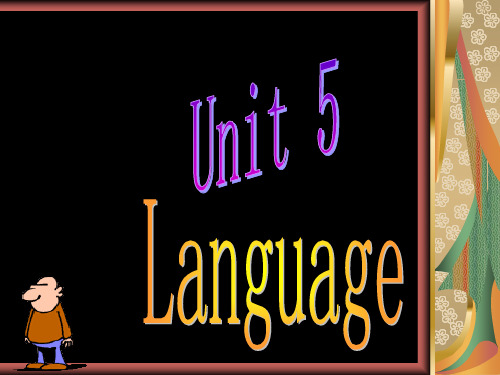
2. Understanding the Details
1) A. The two lives she led before and after the teacher came. B. The day when her teacher came to her. C. Before the teacher came, she lived in a still, dark world in which there was no strong sentiment or tenderness. From that day on, she began to learn not only language but also gained a new insight for life. 2) Because the day marked a turning point in her life. On that day, the teacher came to her to reveal all things to her, including love.
Vocabulary & Structure
Vocabulary Check
What's the adjective form of the following word? event expect passion child
event---eventful expect---expectant passion---passionate child---childless, childlike
she felt the fragments of the broken doll at her feet
pleasant / happy she finally discovered words in the well-house she tried vainly to put the broken doll together
大学英语综合教程3 unit 5
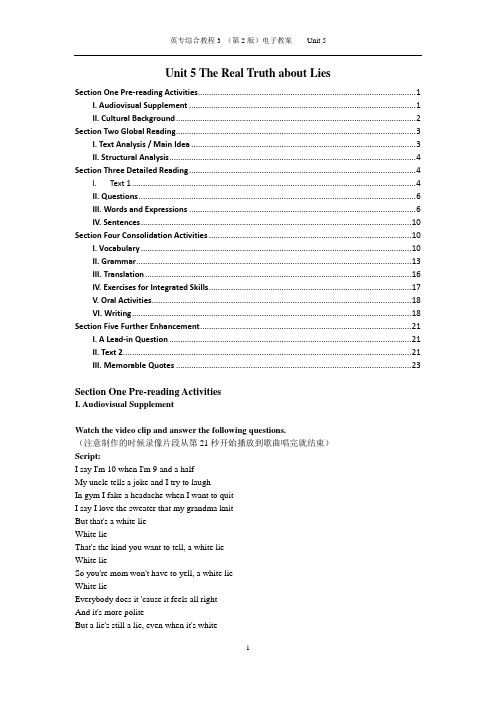
Unit 5 The Real Truth about LiesSection One Pre-reading Activities (1)I. Audiovisual Supplement (1)II. Cultural Background (2)Section Two Global Reading (3)I. Text Analysis / Main Idea (3)II. Structural Analysis (4)Section Three Detailed Reading (4)I. Text 1 (4)II. Questions (6)III. Words and Expressions (6)IV. Sentences (10)Section Four Consolidation Activities (10)I. Vocabulary (10)II. Grammar (13)III. Translation (16)IV. Exercises for Integrated Skills (17)V. Oral Activities (18)VI. Writing (18)Section Five Further Enhancement (21)I. A Lead-in Question (21)II. Text 2 (21)III. Memorable Quotes (23)Section One Pre-reading ActivitiesI. Audiovisual SupplementWatch the video clip and answer the following questions.(注意制作的时候录像片段从第21秒开始播放到歌曲唱完就结束)Script:I say I'm 10 when I'm 9 and a halfMy uncle tells a joke and I try to laughIn gym I fake a headache when I want to quitI say I love the sweater that my grandma knitBut that's a white lieWhite lieThat's the kind you want to tell, a white lieWhite lieSo you're mom won't have to yell, a white lieWhite lieEverybody does it 'cause it feels all rightAnd it's more politeBut a lie's still a lie, even when it's whiteI pretend I'm asleep when my dad walks inI said I ate my chicken but I just ate the skinYour face can say you're lyingWhen your mouth says you're notYour peds are on fire but they're not too hotWhen it's a white lieWhite lieIt's the kind you want to tell, a white lieWhite lieSo your dad won't have to yell, a white lieWhite lieEverybody does it 'cause it feels all rightAnd it's more polite, but a lie's still a lieEven when it's whiteWhile it might be hard to say what's trueWould you want a white lie told to you?But that's a white lieWhite lieThat's the kind you want to tell, a white lieWhite lieSo you're mom won't have to yell, a white lieWhite lieEverybody does it 'cause it feels all rightAnd it's more politeBut a lie's still a lieEven when it's whiteQuestions:1. Why do people tell white lies?Because they‘re white and more polite and make people feel all right.2. What are the common white lies?I say I'm 10 when I'm 9 and a half; I pretend I‘m asleep when my dad walks in, etc. II. Cultural Background(粗体的部门注意在ppt中要保持粗体)1. A white lie is one that lacks evil intent, as opposed to a black lie, which is most certainly malevolent, though normally we don‘t bother to specify that lies are evil. A white lie is harml ess or trivial, which is frequently said in order to avoid hurting someone‘s feelings.2. Behavioral scientist Wendy Gamble identified four basic types of lies for a University of Arizona study in 2000:Prosocial:Lying to protect someone, to benefit or help others.Self-enhancement:Lying to save face, to avoid embarrassment, disapproval or punishment.Selfish:Lying to protect the self at the expense of another, and/or to conceal a misdeed. Antisocial:Lying to hurt someone else intentionally.Section Two Global ReadingI. Text Analysis / Main IdeaThis is a piece of persuasive writing. It is of journalistic style.In this text, the author asserts the ubiquitous presence of petty white lies, analyzes its causes, discusses its grave consequences, and concludes that some lies are justifiable, while others are tobe avoided.II. Structural AnalysisThe author begins with the results of two surveys. Then he comments on the consequences of telling lies. In the end, he discusses which lies should be avoided.Part I (Paras. 1-6) introduces the topic by reporting two survey results.Part II (Paras. 7-11) shows that people often tell white lies so as not to hurt others.Part III (Paras. 12-15) deals with the consequences of telling lies.Part IV (Paras. 16-18) discusses whether lies should be avoided at all costs.Section Three Detailed ReadingI.Text 1The Real Truth about LiesRandy Fitzgerald1 At the University of Virginia in Charlottesville, psychology professor Bella DePaulo got 77 students and 70 townspeople to volunteer for an unusual project. All kept diaries for a week, recording the numbers and details of the lies they told.2 One student and six Charlottesville residents professed to have told no falsehoods. The other 140 participants told 1535.3 The lies were most often not what most of us would call earth-shattering. Someone would pretend to be more positive or supportive of a spouse or friend than he or she really was, or feign agreement with a re lative‘s opinion. According to DePaulo, women in their interactions with other women lied mostly to spare the other‘s feelings. Men lied to other men generally for self-promoting reasons.4 Most strikingly, these tellers-of-a-thousand-lies reported that their deceptions caused them ―little preoccupation or regret.‖ Might that, too, be a lie? Perhaps. But there is evidence that this attitude towards casual use of prevarication is common.5 For example, 20,000 middle and high-schoolers were surveyed by the Josephson Institute of Ethics – a nonprofit organization in Marina del Rey, California, devoted to character education. Ninety-two per cent of the teenagers admitted having lied to their parents in the previous year, and 73 per cent characterized the mselves as ―serial liars,‖ meaning they told lies weekly. Despite these admissions, 91 per cent of all respondents said they were ―satisfied with my own ethics and character.‖6 Think how often we hear the expressions ―I‘ll call you‖ or ―The check is in the mail‖ or ―I‘m sorry, but he stepped out.‖ And then there are professions—lawyers, pundits, public relations consultants —whose members seem to specialize in shaping or spinning the truth to suit clients‘ needs.7 Little white lies have become ubiquitous, and the reasons we give each other for telling fib s are familiar. Consider, for example, a corporate executive whom I‘ll call Tom. He goes with his wife and son to his mother-in-law‘s home for a holiday dinner every year. Tom dislikes her ―special‖ pumpkin pie intensely. Invariably he tells her how wonderful it is, to avoid hurting her feelings.8 ―What‘s wrong with that?‖ Tom asked Michael Josephson, president of the Josephson Institute. It‘s a question we might all ask.9 Josephson replied by asking Tom to consider the lie from his mother-in-law‘s point of view. Suppose that one day Tom‘s child blurts out the truth, and she discovers the deceit. Will she tell her son-in-law, ―Thank you for caring so much?‖ Or is she more likely to feel h urt and say, ―How could you have misled me all these years? And what else have you lied to me about? ―10 And what might Tom‘s mother-in-law now suspect about her own daughter? And will Tom‘s boy lie to his parents and yet be satisfied with his own cha racter?11 How often do we compliment people on how well they look, or express our appreciation for gifts, when we don‘t really mean it? Surely, these ―nice lies‖ are harmless and well intended, a necessary social lubricant. But, like Tom, we should remember the words of English novelist Sir Walter Scott, who wrote, ―What a tangled web we weave, when first we practice to deceive.‖12 Even seemingly harmless falsehoods can have unforeseen consequences. Philosopher Sissela Bok warns us that they can p ut us on a slippery slope. ‗After the first lies, others can come more easily,‖ she wrote in her book Lying: Moral Choice in Public and Private Life. ―Psychological barriers wear down; the ability to make more distinctions can coarsen; the liar‘s perception of his chances of being caught may warp.‖(斜体的部分注意在ppt中保持斜体)13 Take the pumpkin-pie lies. In the first place, it wasn‘t just that he wanted his mother-in-law to feel good. Whether he realized it or not, he really wanted her to think highly of him. And after the initial deceit he needed to tell more lies to cover up the first one.14 Who believes it anymore when they‘re told that the person they want to reach by phone is ―in a meeting‖? By itself, that kind of lie is of no great consequence. Still, the endless proliferation of these little prevarications does matter.15 Once they‘ve become common enough, even the small untruths that are not meant to hurt encourage a certain cynicism and loss of trust. ―When [trust] is damaged,‖ warns Bok, ―the community as a whole suffers; and when it is destroyed, societies falter and collapse.‖16 Are all white lies to be avoided at all costs? Not necessarily. The most understandable and forgivable lies are an exchange of what ethicists refer to as the principle of trust for the principle of caring, ―like telling children about the tooth fairy, or deceiving someone to set themup for a surprise party,‖ Josephson says. ―Still, we must ask ourselves if we are willing to give our friends and associates the au thority to lie to us whenever they think it is for our own good.‖17 Josephson suggests a simple test. If someone you lie to finds out the truth, will he thank you for caring? Or will he feel his long-term trust in you has been undermined?18 And if you‘re not sure, Mark Twain has given us a good rule of thumb. ―When in doubt, tell the truth. It will confound your enemies and astound your friends.‖II. Questions1.What is the result of Professor Bella DePaulo‘s survey? What conclusion can we drawfrom the result? (Paragraphs 1-2)According to the survey done by Professor DePaulo, 140 out of 147 people admitted having told lies. As some of the lies are well-intentioned, people may not regard them as lies. This result shows that telling lies is common.2.What is the result of the survey conducted by Josephson Institute of Ethics? What can welearn from it? (Paragraph 5)According to this survey, among 20,000 students surveyed, 92 percent professed to have told lies and meanwhile, 91 percent never doubted about their own ethics or character. Again, this result shows that telling lies is common and people seldom relate telling lies to morality.3.According to the writer, what could be considered ―nice lies‖? (Paragraph 11)According to the writer, all these co uld be considered ―nice lies‖: complimenting people on their appearance, expressing appreciation for gifts or food.4.What is the grave consequence of telling lies? (Paragraph 15)The ubiquitousness of lies may cause people to be distrustful of each other, thus leading to the collapse of the whole society.Class Activity (该部分放在课文第11段的页面中)Group discussion:What does this sentence ―What a tangled web we weave, when first we practice to deceive‖ mean?Can you give an example to illustrate its meaning?III. Words and Expressionsprofess v.e.g. James professed to know everything about sculpture.He professed the greatest respect for the law.Practice:(制作的时候中文先出现,然后设置按钮,点击以后出现英文翻译)她自称对此事一无所知。
新编大学英语第三册_unit5
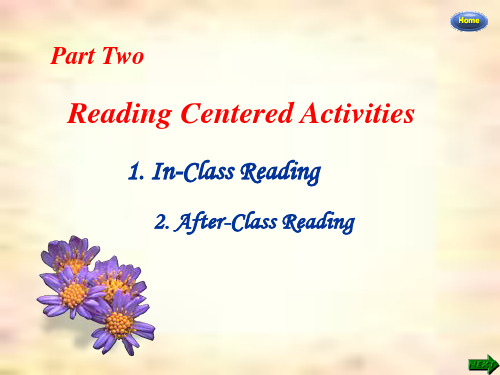
Part Two: In-Class Reading >> Background Information
Dialects and Accents
A dialect usually has its own distinctive grammatical (grammar, syntax), lexical (vocabulary) and phonetic (accent) features.
Part Two: In-Class Reading >> Background Information
When 19 months old, she was stricken with an acute illness that left her deaf and blind. An extremely intelligent and sensitive child, by the age of seven, had invented over 60 different signs by which she could talk to her family.
Part Two: In-Class Reading >> Background Information
Because of this restricted communication , her frustration and anger grew and were not relieved until Annie Sullivan, a 20-year-old graduate of the Perkins School for the Blind, came to be her teacher.
Helen became a remarkable writer and scholar, she wrote “The Story of My Life”
大学英语三unit5
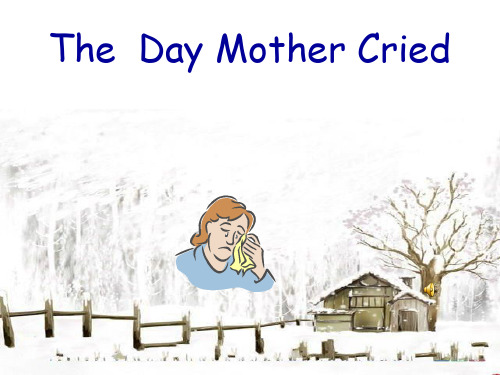
1. Part division
Main Ideas
Found Mother in tears on a dark winter’s day Brought back my memory of the past
Parts Paras 1 2 3 4 1-6 7-17
18-21 Realized Mum’s pressure and vulnerability 22-24 Learned perseverance and courage
Part 1 (paras1-6)
1. Questions
1. What did the author plan to do when he came home from school one winter day?
He planned to read a new issue of his favorite sports magazine.
◆
What pattern is the text organized in? A problem-solution 问题-解决 因果 B cause-effect C general-specific 总-分 D time / sequence 时间 / 顺序
3. Global analysis
2. Who did he see in the living room? What was she doing?
He saw his mother there. She was crying.
3. Why was his mother in tears?
She was going to lose her new job.
Happenings
The family moved to town. Mother started to learn typing. Mother got a job at the radio station. Mother went to work for the first day. Mother had some trouble with her typing. Mother cried. Mother took a new job selling dry goods. Mother got a better job. Mother had already been a journalist. I keep the old typewriter as the best memento.
- 1、下载文档前请自行甄别文档内容的完整性,平台不提供额外的编辑、内容补充、找答案等附加服务。
- 2、"仅部分预览"的文档,不可在线预览部分如存在完整性等问题,可反馈申请退款(可完整预览的文档不适用该条件!)。
- 3、如文档侵犯您的权益,请联系客服反馈,我们会尽快为您处理(人工客服工作时间:9:00-18:30)。
返回我的课程Part 1 Fill in the Blanks (with the right preposition or adverb)(每小题:1 分)Directions: Fill in the blanks in the following sentences with an appropriate preposition or adverb. Fill in each blank with only ONE word. 1.The monkey reached out its hand banana. 2.When he bent dress, she knew he was being particularly kind to her at themoment. 3.In ancient times, women with no children were barred4.An old man was coming 5.country. 6.Pullconversation, will you?time.A. accomplishesB. has accomplishedC. can accomplishD. accomplish2.______ dog was among the first animals to be domesticatedis generally agreed upon by authorities (权威人士) in the field.A. Until theB. It was theC. TheD. That the3._______ is no reason for discharging her.A. Because she was a few minutes lateB. Owing to a few minutes being lateC. The fact that she was a few minutes lateD. Being a few minutes late4.The environment of this city will be more seriously polluted (污染) ______ effective measures are taken to prevent factoriesfrom sending out poisonous gases and wastewater.A. ifB. onceC. howeverD. unless5._____ more and more scientists carrying out large-scalescientific research, the space industry will become morepromising.A. AsB. BecauseC. WithD. Since6.Advertising is distinguished from other forms ofcommunication _______ the advertiser pays for message tobe delivered.A. in thatB. whereasC. whichD. now that7.The meeting was put off because we _______ a meetingwithout Jack.A. objected for havingB. objected to haveC. were objected to havingD. objected to having8.The house was not very old. It __________.A. ought not to have knocked downB. ought not to have been knocked downC. ought not to knock downD. ought not be knocked down9.He has a large collection of books, _______ are written inEnglish.A. any thatB. many of whichC. many in whichD. among many that10.The children went to the construction site to watch the irontower ______.A. to erectIn recent years, there has been an increasing need for teachers to be "responsible". This means that the public expects teachers to succeed in teaching important information to the young. Teachers' salaries today, while not much, certainly are much higher than they were in the past. These increases have come about because people have realized that quality people, individuals who are highly able to teach, will not do it if they are not offered enough money. Today almost no one says that "anybody will do" for a teacher. The public expects "quality people" to teach the young, and progress is being made to give salaries that will make people who have abilities become teachers.1.In the author's opinion, the job of a teacher ________.A. is done best by family membersB. is too complex for most peopleC. is free of rulesD. is important for society2.The cause for the new job of "teacher" was ________.A. the increased importance of laborB. the need for specialistsC. the strict rules of the governmentD. the increased number of children in school3.According to the writer, ________ is on the increasenowadays.A. a need for teachers to have responsibility for themselvesB. a need for teachers to teach responsibility to studentsC. the numbers of students who are entering schoolD. the numbers of people who take the job of teacher4.We learn from this passage that ________.A. money encourages teachers to be responsibleB. money is not a responsible reason to become a teacherC. money is a good way to attract people to become teachersD. money was much higher for teachers in the past5.What do people hardly ever say these days?A. Anyone can be a teacher.B. Progress is being made.C. Teachers have abilities.D. Quality people are teaching the young.Questions 6 to 10 are based on the same passage or dialog.For most people learning to drive, the driving test arises ahead as a major barrier. It is also a general source of conversation whenever drivers are gathered together. There are probably more tall stories about the driving test than about any other motoring subjects; the most remarkable thing about those stories is the number of times the old ones appear again, years after they were first heard, in new and exaggerated forms.All driving examiners have had to pass a very strict selection process, followed by at least six weeks' training. In the course of this training the Department makes sure that their driving is of a consistently high standard.Driving test centers are chosen with equal care. It would be nice to have centers and examiners town by town. But this is just not possible, because the centers have to be at places where there is enough parking space for candidates (考生) and where there are enough test routes. Routes are carefully chosen to make sure that they are all roughly comparable-the proportion of right and leftturns, hills, pedestrian (行人) crossings and so on. The object of allthis is to make sure, as far as possible, that all candidates in the driving test have to cope with the same sort of conditions whether they take the test in New York or California.The work that examiners do in actually carrying out tests is checked continuously by supervising examiners. This is to make as sure as possible that every candidate for the driving test has a proper and equal chance of showing the examiner, in the words of the Regulations, "that he is competent to drive without danger to and with due consideration for other users of the road." This is all that the examiner is concerned with.6.It can be learned from the passage that _______.A. whenever people learning to drive get together, they oftentalk about the driving testB. new and exaggerated stories about the test are alwaysappearingC. there are more tall stories about the driving test than anyother subjectD. the same stories about the test reappear years later7.According to the passage, driving examiners _______.A. are trained for six weeks, then have a difficult selectioninterviewB. are given regular driving tests themselves by supervisingexaminersC. sometimes have more than six weeks' trainingD. are tested during the selection process to see if their drivingis of a high standard8.There isn't a test center in every town because ________.A. some examiners can go to occasional centers from thepermanent centersB. routes and conditions have to be the same everywhereC. there has to be enough parking space for the candidatesand the examinersD. not every town could provide enough test routes close topermanent centersvarious ways to their new technological world. Just getting by in aforeign land without some grasp of the local language is difficult,says Mr. Prensky. Computer immigrants have had to learn to usetechnologies such as the Internet and mobile phones. But relativelyfew of them have embraced video games. The word "game" itselfalso confuses matters, since it makes them seem like playthings."What they don't understand, because they've never played them,is that these are complex games, which take 30, 40 or 100 hours tocomplete," says Mr. Prensky. Games are, in fact, played mainly byyoung adults. Only a third of gamers are under 18."It's just a generational divide," says Gerhard Florin, the Europeanboss of Electronic Arts, the world's biggest games publisher."People do not know what they are talking about, because theyhave never played a game. And yet, they say that millions ofgamers are stupid or violent." Computer natives who have playedvideo games since childhood already regard them as a form ofentertainment equivalent to films and music. Older computernatives now have children of their own and enjoy playing videogames with them.The gaming industry is trying to address the generational divide. Itis producing games designed to appeal to people who have neverplayed games and encouraging gamers (who may occasionallyplay simple web-based games, or games on mobile phones) to playmore. This has led to the development of games with a widerappeal. Some of them replace the usual control pad with novelinput devices: microphones (麦克风) for singing games, camerasfor dancing and action games, and even musical instruments. Inaddition, the industry has started to attract more women, who seemto prefer social simulation (模拟) games such as "The Sims", andolder people, who (if they play games at all) often prefer versions ofcard games and board games. Other promising areas includeportable (便携式的) gaming, mobile gaming and online downloadsof simple games. Many people enjoy gaming, but do notnecessarily want to commit themselves to a long quest that will takedozens of hours to complete.May gaming make people violent?But aren't critics right to worry that gaming might make peopleviolent? In his paper, Mr. Williams describes his study carried outwith Marko Skoric of the University of Michigan. The studyconcentrated on a "massively multiplayer (多人参与的) onlinerole-playing game" (MMORPG) called "Asheron Call 2". This typekill monsters to build up attribute points. It is "virtually more violentthan the average video game and should have more effect, giventhe highly repetitive nature of the violence", the researchers noted. Two groups of subjects were recruited, none of whom had played MMORPGs before and many of whom had never played video games at all. One group then played the game for a month, for an average of nearly two hours per day. The other group acted as a control. All people who participated were asked questions about how often they had aggressive social interactions (such as arguments with their spouses) during the course of the month to test the idea that gaming makes people more aggressive. Game players, it turned out, were no more aggressive than the control group. Whether the test subjects had played games before, the number of hours spent gaming, and whether they liked violent movies or not, made no difference. The researchers noted, however, that more research is still needed to assess the impact of other types of games. All games are different, and only when more detailed studies have been carried out will it be possible to say anything about the impact of gaming.Games have great potential in education.What's more, plenty of games, far from encouraging violence, aremorally complex, subtle and, very possibly, improving. Many nowexplicitly require players to choose whether to be good or evil, andtheir choices determine how the game they are playing develops.Several games based on the "Star Wars" movies require players tochoose between the light and dark sides of the Force, equivalent togood and evil.Even games with no educational purpose require players to learn agreat deal. Games are complex and force players to make a hugenumber of decisions. Gamers must construct ideas about thein-game world, learn its rules through trial and error (错误) , solveproblems and puzzles, develop strategies and get help from otherplayers through the Internet when they get stuck.Games can be used in many other ways. Tim Rylands, a Britishteacher in a primary school near Bristol, recently won an awardfrom Becta, a government education agency, for using computergames in the classroom. By projecting the fantasy world of "Myst",a role-playing game, on to a large screen and encouraging his11-year-old pupils to write descriptions and reactions as he plays it,So games are inherently good, not bad? Actually they are neither, like books, films, the Internet, or any other medium. All can be used to depict sex and violence, or to educate and inform. Indeed, that there is violence and sex in games is arguably a sign of the maturity of the medium, as games become more like films.1.Video games are valuable or stupid depending on________________.A. what is overlookedB. whom is askedC. whether they are violentD. whether they are educational2.No evidence exists to show that video games________________.A. are overlookedB. make people violentC. have great potentialD. are violent3."Computer immigrants" are older people who have had to________________.A. get by in a foreign landB. play complex gamesC. adjust to the new technologyD. grow up with technology4.What do we learn about "computer natives"?________________A. They enjoy playing video games with children.B. They have played games since childhood.C. They are producing games which are violent and stupid.D. They like films and music as entertainment.5.What is said about the gaming industry? ________________A. It has started to attract more young adults.B. It is trying to persuade older people to play singing games.C. It is producing games that will take dozens of hours tocomplete.D. It is trying to attract people who have never played games.6.Asheron Call 2 is a kind of game that ________________.A. is less violent than the average video gameB. critics are right to worry about, as it is violentC. requires the player to kill monsters to build up attributepointsD. requires the player to travel around the world7.In the study of MMORPGs, game players________________.A. could not control their game playB. asked many questionsC. were more aggressiveD. were not especially violent(To be shown in 3 days.)Total: 75正确率:75% => 就此结束考试,返回我的课程。
